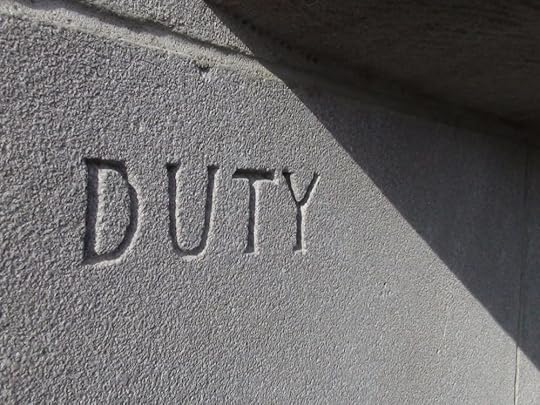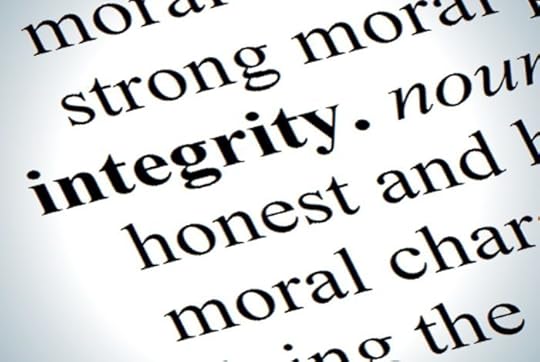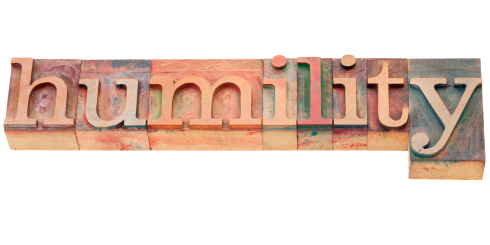Dave Anderson's Blog, page 3
May 22, 2018
Being Unreliable Limits Your Ability to Lead
Do we choose to do what needs to be done, or just what we want to do? Do we choose to follow through on all our commitments or flake out? Do we choose to give our best in all areas of our jobs, or just the part we really enjoy? Being unreliable limits our ability to lead others.
The business world may call this accountability. But we use the term Duty, as do our heroes who serve in the military. Understanding what our Duty is does not have to be complicated – especially as a leader.
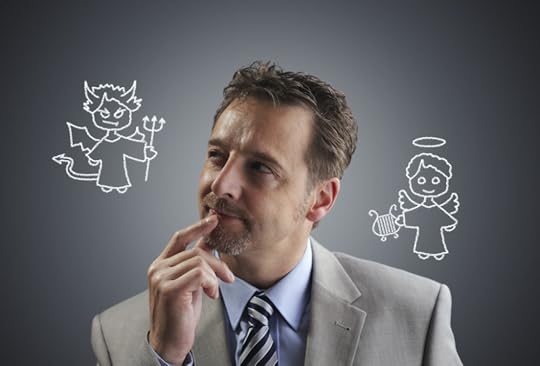
The Choices We Make
What choices do we make when we are tempted to take the easy way? When we are tempted to do what we want to do instead of what we need to do?
Are we people who can be counted on to do our Duty in every circumstance? To evaluate that, we have to look at our choices. The choices we make on a regular basis become habits. The good habits and the bad habits we develop, based on those choices determine our character.
There are six Habits of Character that are foundational to becoming a Leader of Character: Courage, Humility, Integrity, Selflessness, Duty and Positivity. They are all developed much like a muscle – through consistent exercise.
If you are interested in seeing how those muscles have developed in you, take this FREE My Mirror Character Assessment by clicking on the link below. It is confidential, and you can get a feel for how well developed the Habits of Character are in your life.
Click here: http:/mycharactertest.com
Choosing Duty is not Easy
No one gets in shape by going to the gym occasionally or reading a fitness magazine. We have to actually make the choice to regulary exercise and push ourselves beyond what is comfortable. That is how you build muscle. That is also how you will develop the habit of Duty.
Andersons’ 12 Word or less Definition of Duty
Taking action based on our assigned tasks and moral obligations
It is hard to:
Do the things you should do even if you don’t feel like doing them.
Do things not in your job description that still need to be done.
Do the boring administrative parts of your job with the same care and commitment as the fun parts.
Take the time to mentor someone when you have your own work to do.
None of these choices are easy. But they are the right choices to make. The more we exercise Duty, the more that Duty becomes one of our Habits of Character. Habits are formed one choice at a time.
Each time we make the choice to do our Duty, by acting on our assigned tasks and moral obligations, the more reliable we become. The more reliable we are, the more people will trust us and therefore follow us.
The Bottom Line:
If we can’t rely on someone to act on both his/her assigned tasks or moral obligations, we will think twice about following them. If we are unreliable as a leader our people at work, and our families at home may have the same reaction.
An unreliable leader is not a Leader of Character. A Leader of Character acts on his/her assigned tasks and moral obligations because it is his/her Duty to do so. How they feel about that task or how they feel at that moment does not make the choice for them. They choose to do their Duty.
It all comes down to our choices. The choice is ours – unreliability or Duty. Being unreliable limits our ability to lead. Exercising Duty helps us become the Leader of Character our teams, our loved ones, and our culture truly need us to become.
Question:
What commitment do you wish you hadn’t made – yet still need to follow through upon?
You can purchase Dave’s best seller Becoming a Leader of Character through Amazon here: bit.ly/LOCBook
Or get a personalized signed copy here: Signed Copy
The post Being Unreliable Limits Your Ability to Lead appeared first on Dave Anderson.

May 15, 2018
Selfishness Limits Your Ability to Lead
Selflessness or selfishness. We all make daily choices that prove we are selfish or selfless. Selfishness limits our ability to lead and have truly committed followers.
If you really want to understand what type of character someone has, look at the choices they make on a habitual basis. When faced with choosing what THEY want versus what may be best for others, what do they choose? Selflessness or selfishness?

Leaders of Character understand some things about leadership that selfish leaders do not.
The leader is there for the led and not vice versa.
It is not the role of the leader to get his way, but to find the best way.
If the leader is not developing his people, he is not leading.
Selflessness is a Habit of Character that we can all develop. We develop Selflessness and every Habit of Character in the same way – through consistently making the choice to act selflessly.
Andersons’ 12 Word or less Definition of Selflessness
Putting the needs of others before my own needs, desires or convenience.
The Daily Choices
What do our choices display? Do we choose our own needs, desires, or convenience over what is best for another person?
When faced with these choices, other Habits of Character are involved. It takes both Courage and Humility to put aside our own needs, desires, or convenience in order to exercise Selflessness.
I use the verb “exercise” because that is in fact what we are doing. Each time we perform a selfless act, it is like building a muscle at the gym – that muscle gets stronger.
Think of it like reps in the gym when we are lifting weights. With each choice we make – each character rep – we are strengthening our character. #CharacterReps (credit to @COLCraigFlowers)
If we choose to exercise Selflessness, we are also strengthening our Courage and Humility, similar to the way a bench press works not only the chest, but also the shoulders and the triceps.
We don’t get stronger and more fit by exercising every once in awhile. We gain strength and fitness with consistent exercise.
We will not become a selfless Leader of Character by periodically putting the needs of others before our own needs, desires, and convenience. It must be done regularly to become a Habit of Character and to be strong enough to rely on when we face the big tests in life and in leadership.
If you want to see where your character is right now, take the following online My Mirror Character Assessment. IT FREE! And no one sees the results but you.
Click here: http:/mycharactertest.com
The Bottom Line:
Selfishness is a choice. Selflessness is a choice. Each time we choose our own needs, desires, or convenience over the needs of the people we lead, we damage our ability to lead them.
With every choice we make, we take a step closer to becoming a Leader of Character, or we take a step further away. If you are looking in the mirror right now and realizing you have been making selfish choices and losing the commitment of those you wish to lead, there is great news!
You can begin to change your character today! You can make a new choice and start developing the muscles called Selflessness. It won’t be easy. Those first workouts never are. But we never get in shape unless sweat is involved do we!
To BE a Leader of Character, we must begin to DO the things Leaders of Character do. We must put aside our own selfish natures and place the needs of others first.
This is a choice. Each time we make that choice, it makes it easier to make that choice again. That is how all habits are formed. That is how a Habit of Character is formed. That is how Selflessness is formed. That is how we become a Leader of Character.
Question:
What part of selfishness is hardest to fight – your needs, desires, or convenience?
You can purchase Dave’s best seller Becoming a Leader of Character through Amazon here: bit.ly/LOCBook
Or get a personalized signed copy here: Signed Copy
The post Selfishness Limits Your Ability to Lead appeared first on Dave Anderson.

May 8, 2018
Hypocrisy Limits Your Ability to Lead
Part time Integrity is not really Integrity. It is hypocrisy. Hypocrisy limits our ablity to lead. If we only choose Integrity when it is easy, what are we? Answer: Hypocrites.
Most people do not look in the mirror and think – hypocrite. But, if we pick and choose when we act with Integrity, what should we call ourselves? Answer: Hypocrites

It all boils down to a choice. Do we choose the easy path or the path less travelled? Do we choose hypocrisy or do we choose Integrity?
The Choices We All Face
Our character is the sum total of our habits – the good habits and the bad habits. Our habits are formed based on our choices. Each time we make a choice, it makes it easier to make that same choice again.
Each time we choose hypocrisy, it makes it easier to choose it again. Each time we choose Integrity it becomes easier to choose Integrity the next time as well. The issue comes down to our choices when we are tempted to take the easy route.
Do I choose to allow someone to be deceived about my role in a team’s success, or do I proactively clarify things?
Do I choose to move to the front of the line, or offer the spot to someone who was waiting longer?
Do I choose to bend the rules to make my life easier, or do I follow the letter of the law and not cut corners?
All of these choices have an effect on our character. The size of the choices or the consequences implicit in those choices is not important. If we choose anything other than Integrity, then we should rightly see ourselves as hypocrites.
The Easy Choices
“If doing the right thing were easy, everyone would be doing it.”
– My dad (The General)
The fast track to hypocrisy is to consistently choose the path of least resistence. The pragmatic decision, the decision to do what would make our lives easier, is frequently the wrong choice when it comes to our character.
Andersons’ 12 Word (or less) Definition of Integrity
Doing what is good and right and proper, even at personal cost.
If the only time we choose the right thing is when it can’t hurt us, we can’t call ourselves a person of Integrity.
The Hard Choices
Integrity is not forged in the easy choices. It is forged in the hard choices. The easy choices make us hypocrites and hypocrisy limits our ability to lead.
It is hard to be the person who stands alone in a crowd of people who all want to make the easier choice. It is hard to put ourselves at a disadvantage because we chose the harder path of Integrity. But it is the habit of making these hard choices that creates a leader of Integrity other people want to follow.
The Bottom Line:
The choice between hypocrisy and Integrity presents itself everyday. The opportunity to build up our character or tear it down is always in front of us.
Whether we are hypocrites or Leaders of Character depends on our daily choices – the big choices and the small choices.
Choosing Integrity does not always bring tangible rewards. Most of the time the only reward is an inward one. We have just become a stronger leader with stronger character.
The choice is ours: Hypocrisy or Integrity
Question:
What choice – large or small- do you face that will test your Integrity today?
You can purchase Dave’s best seller Becoming a Leader of Character through Amazon here: bit.ly/LOCBook
Or get a personalized signed copy here: Signed Copy
The post Hypocrisy Limits Your Ability to Lead appeared first on Dave Anderson.

May 1, 2018
Pride Limits Your Ability to Lead
Humility or arrogance? As leaders if we believe we are the most important person in any situation, our pride limits our own ability to lead.
Our culture seems to celebrate the arrogance of leaders who pound their chests and promote their own accomplishments. But a Leader of Character is a counter-culture leader because a Leader of Character chooses Humility instead of arrogance. The choice is ours.

The Choice
Do we choose to argue with people instead of admitting we blew it? Do we choose to avoid asking for help, when we are struggling? Do we choose to formulate rebuttals instead of truly listening to another person? Do we choose to behave like we have it all figured out instead of constantly searching for ways to grow?
The choice is ours. Do we choose the pride that limits our influence, or the Humility that inspires followers?
The Cultural Choice – Look at me!
Many people believe that Humility is a sign of weakness. They believe that people will think less of them if they choose to act with Humility. Therefore, their pride takes over and arrogance steps in.
“If I don’t toot my own horn, who will?”
“If I make a mistake, they will think less of me.”
“This isn’t arrogance, it is confidence.”
“If I show a weakness, I will be less respected.”
“I have been doing it this way for a long time, I am not changing now.”
“I need to get my way here, or else I will look weak.”
“I never questioned my leaders and neither should my people.”
But that pride limits our influence on others. To be a humble Leader of Character we need to put aside our instincts, our sinful natures, and the voices of the culture and realize: As leaders – It is never about us!
The Counter-culture Choice – It’s not about me!
Andersons’ 12 Words (or less) Definition of Humility
Believing and acting like “It’s not about me.
A Leader of Character does not see Humility as a sign of weakness but a quiet declaration of strength.
Leaders of Character understand:
It is the arrogant leader who refuses to ask for help or admit mistakes.
It is the arrogant leader that needs to have the attention and win every argument.
It is the arrogant leader who demands the spotlight and craves recognition.
It is the arrogant leader who fears what others might think if he fails or admits a weakness.
Humility is a countercultural approach to leadership. The brash and the bold leaders are constantly getting the headlines or are pounding their chests in professional sports. But, who really wants to follow an arrogant leader?
The Leader of Character understands that he can be humble and confident at the same time. They know that sometimes the people doing the most self-promotion are often the most insecure. In fact, the people they are trying to lead see that as well.
The Bottom Line:
We all have a choice between Humility and arrogance. When we begin to make choices in order to place ourselves in the center of the story, we have become an arrogant leader whose pride limits our impact on the people we wish to lead.
To be a Leader of Character, we must overcome the ugly pride that wells up inside of all of us. Each time we beat back the beast of pride and choose Humility, we improve our ability to lead with character.
Pride places us right in the middle of our cultural norms and makes us just one of the ever growing crowd of people leading with arrogance.
Humility makes us a countercultural Leader of Character. We will be the rare leader who does not need the spotlight, will admit mistakes, and be on a constant search to get better.
The choice is ours.
Question:
Would you follow you?
You can purchase Dave’s best seller Becoming a Leader of Character through Amazon here: bit.ly/LOCBook
Or get a personalized signed copy here: Signed Copy
The post Pride Limits Your Ability to Lead appeared first on Dave Anderson.

April 24, 2018
Fear Limits Your Ability to Lead
Courage or Cowardice? It is the leader’s choice. There is no middle ground. Fear limits your ability to lead. Leaders are constantly confronted with choices that will expose us as a coward or a courageous Leader of Character.
Our choices when we face our fears define who we are as a leader.

Fear Limits Us
What do we do when we are faced with uncertainty?
What do we do when we are faced with a situation that makes us uncomfortable?
What do we do when we are faced with saying what someone wants to hear versus something they need to hear?
The choices we make when fear raises it’s ugly head determines the impact we will have on those we lead. These are not easy choices, but they are the choices we all face as leaders.
The Easy Choice – Do Nothing
We can choose the easy route. The easy thing to do in many cases is to let our fears make our decisions for us.
“I don’t know how he will react.”
“I trust very few people.”
“I’m just not good at confrontation.”
“I’m too young to say anything.”
“I don’t know how it will turn out.”
“I’ve never done this before.”
“I don’t know him.”
“She never reacts well in these situations.”
“I might lose my job.”
“I might lose my friend.”
“Nobody else is doing anything about it.”
Therefore, we do nothing. Fear has won the day. We have lost an opportunity to grow and do the right thing. And our fear limits our ability to lead.
Andersons’ 12 word (or less) Definition of Courage
Acting despite perceived or actual risk.
The Hard Choice – Acting with Courage
Leaders of Character will have a lot of the same reservations as those who make the easier choice. But instead they decide to exercise Courage. Courage is the fulcrum that defines a leader’s character.
Without Courage, Integrity is impossible. If we only do the right thing when it easy or there is no risk involved, that is not Integrity, that is pragmatism. The Courage to make the hard choices leaders are faced with determines whether we are a Leader of Character.
Without Courage, Selflessness is impossible. To be selfless, we must be willing to give up our desires or comfort for the good of someone else. We must have the Courage to have a hard conversation with an employee, spouse, or child. If fear prevents us from speaking up, then fear has convinced us our own comfort is more important than the other person.
The Bottom Line:
Few of us picture ourselves as cowards. But what are we if we let fear make our choices for us? Leaders of Character do not have a magic pill or some special power that helps them make those hard choices. They just have more practice at making those choices.
Practice Courage in the small things and your character will be prepared when you need Courage in the big things in life.
All of us can develop the habit of Courage by making the hard choices instead of the easier choices. The more we make a choice, the easier it is to make that same choice again. That is how all habits are formed – one choice at a time.
Each time we choose to act with Courage the easier it is to make the same choice again. Conversely, each time we choose to let fear make our decisions, it makes it easier to do that again as well.
Leaders must have the Courage to make hard choices whether it is at work or at home. Developing the Habit of Character called Courage will do more to impact your ability to lead than any MBA course ever will.
Question:
When a leader chooses fear would you follow them? Would you follow you?
You can purchase Dave’s best seller Becoming a Leader of Character through Amazon here: bit.ly/LOCBook
Or get a personalized signed copy here: Signed Copy
The post Fear Limits Your Ability to Lead appeared first on Dave Anderson.

April 17, 2018
A Short Story about Great Positivity in 500 Words
When you are dealt a bad hand, you can choose to exercise great Positivity or you can wallow in self-pity. It is your choice. Iesha Champs made her choice. She chose her attitude and went from homeless to law school. Read her story and see how great Positivity can change your world.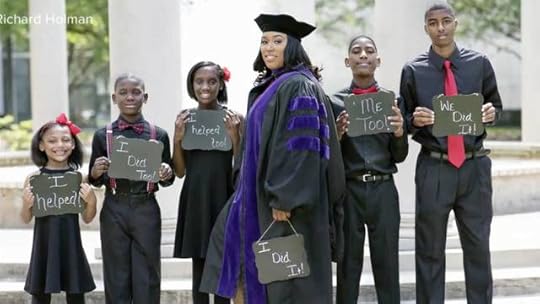
I first saw this story on ABC News on Sunday, April 15.
Exercising Great Positivity
Iesha Champs, 33, of Houston, had a tough childhood. Her parents were addicted to drugs so she lived with her grandparents for a while before being placed in foster care. She eventually dropped out of high school.
When she was 19, she became a mother and had to get a job. She later went to have four more children. At one point she was homeless.
Then, almost 10 years ago, Champs said, one of the members of her church called her with a message and a reminder about a dream Champs had since she was 7 years old.
“[She said:] ‘God told me to tell you that you need to go back to school to get your GED because that lawyer you want to be, you’re going to be it,'” Champs said.
Champs said she was skeptical. At the time, she’d lost her job and had lost all of her family’s belongings in a house fire. She was pregnant again and had just learned that her children’s father had cancer. She said she felt hopeless.
Champs decided to start studying for the GED because she had nothing to lose. Once she got her GED, she didn’t stop. She applied and was accepted to Thurgood Marshall School of Law at Texas Southern University. Champs said getting through those three years of law school was a family affair.
“I went through law school, not by myself. I had such an amazing support system,” she said.
Champs called her children “mini lawyers,” not only quizzing her with flash cards and serving as her mock jury before examinations but also stepping up to cook dinner and helping get each other ready for school each morning.
“My children mean the absolute world to me. … There have been so many times that I wanted to quit law school — I probably quit 10 times in my head already. … ” she said. But she didn’t let her circumstances or her past define her future.
“I look at these graduation photos and I say, ‘This is here a woman who knew that the odds were against her and she destroyed them,'” Champs said. “I mean, wow!”
The Bottom Line:
Law school is hard enough for someone blessed to live in a healthy family situation. But many of those with a pain free past do not succeed in law school because they have a bad attitude.
That is not Iesha Champs! She understands you can’t overcome long odds without exercising great Positivity. Now her children understand that as well!
Question:
Who do you know that was dealt a bad hand yet exercises great Positivity?
You can purchase Dave’s best seller Becoming a Leader of Character through Amazon here: bit.ly/LOCBook
Or get a personalized signed copy here: Signed Copy
The post A Short Story about Great Positivity in 500 Words appeared first on Dave Anderson.

April 4, 2018
A Short Story about Great Duty in 500 Words
Some people believe that doing their Duty is following directions or adhering to a job description. But actually, having a great sense of Duty, goes beyond those things. President George W. Bush and his predecessors had a different view of their Duty at Christmas than our last two presidents. Read about that here in 500 words or less….
Anderson’s 12 Word or Less Definition of Duty
Taking action based on our assigned tasks and moral obligations.
Great Duty
Whenever a president travels, he is never alone. When the president is away from the White House hundreds of personnel including White House staff, secret service, and press reporters are assigned to be on those flights and staying in hotels away from home and away from their families.
At Christmas those requirements do not change. That is why President George W. Bush never traveled over Christmas during his eight years in office.
President Bush spent his Christmas holidays 60 miles from Washington D.C. at Camp David. Why? So his staff, the secret service, and the reporters assigned to him, could wake up in their own beds on Christmas morning and be with their families.
In fact, President Clinton, the elder President Bush, and President Reagan all spent Christmas at Camp David or the White House for the exact same reason as George W. Bush. They felt like it was their moral obligation to do that for those families.
Contrast that with recent history. For eight years of his presidency, President Obama spent Christmas in Hawaii. This past Christmas, President Trump spent Christmas in Florida. As a result, hundreds of families were seperated on Christmas morning.
For the past 9 years, it has been the Duty of all those support personnel to spend their Christmas holidays, away from their families. It’s part of their assigned tasks. They really have no choice.
The president can make a choice though. The president deserves a break at Christmas. The demands of being president are extraordinary. However, how much more extraordinary is the great sense of Duty President George W. Bush and his predeccessors?
The Bottom Line:
The choices of those past presidents demonstrated that they believed it was their moral obligation to stay close to Washington D.C. for the sake of hundreds of others who always served them.
When anyone exercises Duty, they often exercise the habits of Humility and Selflessness as well.
Andersons’ 12 Word or less Definition of Humility
Believing and acting like “It’s not about me.”
Andersons’ 12 Word or less Definition of Selflessness
Putting the needs of others before my own needs, desires, and convenience.
Were these presidents alway humble or selfless? I doubt it. But that choice to not travel over Christmas exercised Humility and Selflessness. The more we exercise a muscle, the stronger it gets. With each #CharacterRep, we build our character.
Question:
What moral obligations will you face this week?
You can purchase Dave’s best seller Becoming a Leader of Character through Amazon here: bit.ly/LOCBook
Or get a personalized signed copy here: Signed Copy
The post A Short Story about Great Duty in 500 Words appeared first on Dave Anderson.

March 27, 2018
A Short Story of Great Selflessness in 500 Words
There are a lot of people who do good things to benefit others. But, it is really special when someone exercises great Selflessness and does not look to be recognized for doing it. One cold night in New York City, Officer Deprimo did just that. Here is his story….
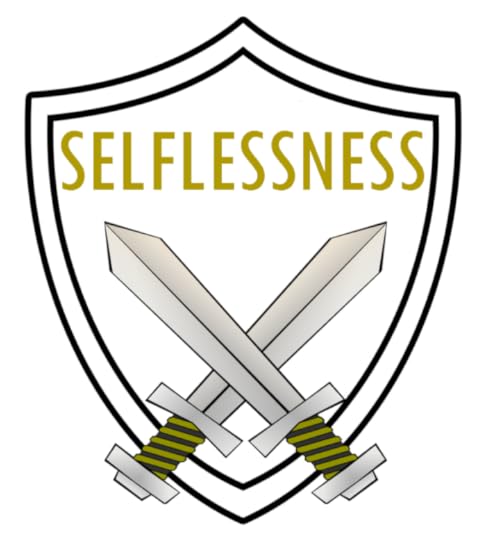
Great Selflessness
On a cold November night in Times Square, Officer Lawrence DePrimo was working a counterterrorism post when he encountered an older, barefooted homeless man. The officer disappeared for a moment, then returned with a new pair of boots, and knelt to help the man lace them up and put them on.
The act of kindness would have gone unnoticed and mostly forgotten, had it not been for a tourist from Arizona.
Her snapshot— taken with her cellphone on Nov. 14 and posted to the New York Police Deparment’s Facebook page late the next day, made Officer DePrimo an overnight Internet hero.
Officer DePrimo, 25, who joined the department in 2010 and lived with his parents on Long Island at the time, was shocked at the attention.
The officer, normally assigned to the Sixth Precinct in the West Village, readily recalled the encounter. “It was freezing out and you could see the blisters on the man’s feet,” he said in an interview. “I had two pairs of socks and I was still cold.” They started talking; he found out the man’s shoe size: 12.
As the man walked slowly down Seventh Avenue on his heels, Officer DePrimo went into a Skechers shoe store at about 9:30 p.m. “We were just kind of shocked,” said Jose Cano, 28, a manager working at the store that night. “Most of us are New Yorkers and we just kind of pass by that kind of thing. Especially in this neighborhood.”
Mr. Cano volunteered to give the officer his employee discount to bring down the regular $100 price of the all-weather boots to a little more than $75. The officer has kept the receipt in his vest since then, he said, “to remind me that sometimes people have it worse.”
-Adapted from a 2012 New York Times article
Andersons’ 12 Word or less Definition of Selflessness
Putting the needs of others before my own needs, desires, or convenience.
The Bottom Line:
“Sometimes people have it worse.” is a great reminder to all of us. We often get caught up in our ourselves and forget that fact.
Many people intend to be selfless, but they pass up daily opportunities to serve other people. Often, we walk by because it is inconvenient at the moment to stop and serve someone else’s needs. The thing is, it is rarely convenient to exercise Selflessness.
Officer Deprimo saw a need, and he took care of the need. He decided to exercise great Selflessness without looking for recognition for doing it.
By the way, if we like to get recognition each time we exercise Selflessness – it may not be that selfless.
Question:
What is a simple selfless thing you can do for someone else today?
You can purchase Dave’s best seller Becoming a Leader of Character through Amazon here: bit.ly/LOCBook
Or get a personalized signed copy here: Signed Copy
The post A Short Story of Great Selflessness in 500 Words appeared first on Dave Anderson.

March 20, 2018
A Short Story of Great Integrity in 500 Words
Athletes have the opportunity to exercise great Integrity every time they play the game. But, many times we see great athletes result to gamesmanship instead of sportsmanship. They sacrifice their Integrity in order to gain an advantage. But, there are some athletes who do the right thing – even at personal cost. Here is one example of great Integrity in under 500 words.
The following was written by famed sportswriter Frank Deford:
In May of 2005, Fernando Verdasco of Spain was serving to America’s top player, Andy Roddick. Verdasco had lost the first set and was down 5-3, love-40. Triple match point. He hit deep on the second serve. The line judge called the ball out and Roddick had the match, only Roddick refused to accept the point. Verdasco’s serve had nicked the line, he said. Stunned, the umpire let Roddick overrule him. Verdasco then fought back, held serve, won the set and then the match.
Probably you heard nothing about this display of generosity. It barely rated a mention in the American press. Yet, Roddick risked and lost tens of thousands of dollars in a tournament where he was seeded first simply because he felt obliged to be honest….Roddick, by the way, could not have been criticized if he’d simply accepted the bad call. The ethic in modern, big-time sport is that it’s up to the officials to call the game and for the players merely to abide by those decisions even if they know that they have succeeded under false pretenses….
In one moment with victory his for the taking–no, not for the taking–is given, is assumed, Andy Roddick went against the way of the world and simply instinctively did what he thought was right. Once upon time we called such foolish innocents sportsmen.
Andy Roddick lost a lot that day. He lost the point. He lost the set. He lost the match. Plus, he lost tens of thousands of dollars of prize money he would have earned by winning that tournament.
Andersons’ 12 word or less Definition of Integrity
Doing what is good and right and proper, even at personal cost.
Andy Roddick lost a lot that day. But, he strengthened his Integrity, and he won a lot of admirers.
The Bottom Line:
Each of the six Habits of Character – Courage, Humility, Integrity, Selflessness, Duty, and Positivity – is like a muscle. The more we exercise it, the stronger it gets.
Andy Roddick exercised great Integrity – even at personal cost. Integrity is not difficult until it costs you something. That is when great Integrity takes over. That is when Leaders of Character step up and do the right thing – even at personal cost.
Question:
What price are you willing to pay for your Integrity?
You can purchase Dave’s best seller Becoming a Leader of Character through Amazon here: bit.ly/LOCBook
Or get a personalized signed copy here: Signed Copy
The post A Short Story of Great Integrity in 500 Words appeared first on Dave Anderson.

March 13, 2018
A Short Story of Great Humility in 500 Words
Very few stories of Humility ever make the news. Sports stars and politicians fight for the spotlight and the media gives it to them. The people we should emulate are the ones who don’t need the spotlight. Sam Rayburn illustrates for us what great Humility looks like. You can read about him here in less than 3 minutes!
Great Power with Great Humility
Andersons’ 12 Word or less Definition of Humility
Believing and acting like “It’s not about me.”
Powerful people rarely lack confidence but, they often lack Humility.
Sam Rayburn served as the Speaker of the House of Representatives in the United States Congress for seventeen years. As the Speaker of the House, Sam Rayburn wielded incredible power and prestige. He was third in the line of succession to the presidency.
One day, he found out that the teenage daughter of a reporter friend had tragically died. Early the next morning, Sam Rayburn knocked on the door of his friend. When the door opened, Rayburn asked if there was anything he could do. His friend stammered and replied, “I don’t think there is anything you can do. We are making all the arrangements.”
“Well, have you had your coffee this morning?” Rayburn asked.
“No. We haven’t had time.” said the grieving man.
“Well,” the Speaker of the House replied, “I can at least make the coffee.”
As he watched this powerful man make him coffee, the father suddenly remembered something. “Mr. Speaker, I thought you were supposed to be having breakfast at the White House this morning.”
“Well I was, but I called the President and told him I had a friend who was in trouble, and I couldn’t come.”
Sam Rayburn turned down breakfast with the President of the United States to make coffee for a grieving friend. Great Humility can be exercised by people of great power.
The Bottom Line:
What type of information are we absorbing? Do we read fiery political stories that already support our own views? Do we watch shows or read magazines that gossip about celebrities?
Or do we feed our brains with stories about character in action?
What we marinate our brains in, affects who we become and how we develop our character.
Developing Character
Our character starts with our thoughts.
Our thoughts shape our words.
Our words influence our actions.
Our actions, repeated over time, become our habits.
Habits form our character.
We can all use Sam Rayburn’s exercise of great Humility to shape our thoughts, our words, and our actions. Each time we make a choice (i.e. take action) it makes it easier to make that same choice again. That is how we develop habits, and our habits form our character.
I am going to keep sharing short stories of great character like the great Humility shown by Sam Rayburn. Please share this story with others via email or social media.
Question:
What story of great Humility can you share?
You can purchase Dave’s best seller Becoming a Leader of Character through Amazon here: bit.ly/LOCBook
Or get a personalized signed copy here: Signed Copy
The post A Short Story of Great Humility in 500 Words appeared first on Dave Anderson.


